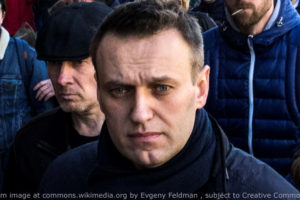Russian Prison Authority Confirms Navalny Transfer, Doesn’t Reveal Location

(Article text ©2021 RFE/RL, Inc., Radio Free Europe/Radio Liberty – rferl.org – MOSCOW, Feb. 26, 2021 – article text also appeared at rferl.org/a/russia-navalny-prison-transfer-confirmed-location-not-revealed/31123284.html)
Russia’s prison authority has confirmed that opposition political leader Aleksei Navalny has been moved from the Moscow detention center where had been held since mid-January to another prison.
Aleksandr Kalashnikov, the head of the Federal Penitentiary Service (FSIN), did not specify on February 26 where the Kremlin critic was being taken, nor was it clear whether Navalny had arrived at the facility or if he was still on his way there to begin serving a 2 1/2 year sentence.
“He has been transferred to where he is supposed to be under the court ruling,” Kalashnikov told reporters.
“I guarantee that there is no threat to his health, let alone his life,” he added.
The Russian authorities typically do not provide information about the transfer of prisoners until after they reach their destination, which could be anywhere in the country.
The confirmation comes a day after Navalny’s lawyer, Vadim Kobzev, said he had gone to the detention center where Navalny, 44, was being held, only to find he had been taken to an undisclosed location.
On February 2, a Moscow court changed a 3 1/2 year suspended sentence that was handed down to Navalny in 2014 to a custodial sentence after ruling that the anti-corruption crusader had violated the terms of the earlier court decision. After deducting time already served in custody, the court ruled that Navalny must spend 2 1/2 years behind bars.
Navalny was detained by Russian police in January immediately upon returning from Berlin, where he was recovering from what German investigators determined was a poisoning attempt using a Novichok-type nerve agent.
Russian authorities claimed that he violated the terms of his suspended sentence by not contacting corrections officials while he was receiving treatment in Germany.
Navalny fell ill in August 2020 while flying from Siberia to Moscow and, after emergency medical intervention in Omsk, he was medically evacuated to Germany, where he spent several months recovering.
He has blamed the incident on Russian President Vladimir Putin, and the open-source investigative organization Bellingcat has tied the poisoning to a team of Russian Federal Security Service (FSB) operatives.
The Russian government has denied involvement in the poisoning and has refused to open a criminal investigation into the incident.
Navalny and his supporters have said the criminal cases filed against him, the poisoning attack, and other incidents of harassment are retribution for his political activity and his outspoken criticism of the Putin government.
Navalny’s arrest and sentencing set off a wave of national protests that the authorities responded to forcefully, detaining more than 10,000 people in dozens of cities and filing administrative and criminal cases against many of them.
The European Union is in the process of considering fresh sanctions against Russia over the Navalny case and has criticized Moscow for ignoring a ruling by the European Court of Human Rights ordering that he be released immediately.
The United Nations said on February 26 that its human rights investigators will issue their findings from an investigation of Navalny’s case at a press conference in Geneva, Switzerland, on March 1.
